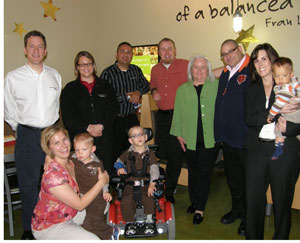Book characters with disabilities — stop the clichés!
by Beth Finke
In my other life, I’m a published author. My children’s book Hanni and Beth: Safe & Sound won a Henry Bergh children’s book award from the American Society for the Prevention of Cruelty to Animals (ASPCA).
I try to keep up with other authors who write about disabilities, so I appreciated it when a fellow writer forwarded a post from the YA Highway blog that spelled out some dos and don’ts when it comes to writing about characters with disabilities, or CWD. Whether you are a writer or not, I thought you might find some of her tips interesting.
The blogger says that just like when you’re writing about any other character, it’s important to have a well-rounded three-dimensional realistic characterization. She reminds writers how important it is to get the research right: read up on your subject and get to know people with disabilities in real life. “I read so many awful unrealistic depictions of CWD, especially characters with autism spectrum disorders,” she writes. “Good research, knowledgeable beta readers, and knowing people who are like the people you’re writing about are all essential!”
The blogger warns writers to avoid going in for the same old tired clichés and lists some of the more wretched clichés she’s seen in books with characters who have disabilities:
- CWD who exists only to teach a very special important lesson to the MC, either by being plucky, dying, or being plucky and then dying. These characters don’t exist for their own benefit, they’re only there to provide Life Lessons.
- CWD who only exists to inspire or motivate the MC but has no goals or desires of her own.
- CWD who is an object of pity, and acts only as a completely inactive idle piece of scenery on the novel stage.
- CWD who is 100% solely about their disability. No one is 100% all about one thing. Why wouldn’t a character with a disability have a whole spectrum of other characteristics — traits, hobbies, interests, friends, and family like any other well-rounded character?
- CWD who is magically cured of their disability in a fantasy novel. It’s a cheapo plot point that only serves to emphasize how undesirable it is to be a person with a disability.
The blogger leaves us with one last important bit of advice: don’t limit the adventure potential of your characters with disabilities. It is the 21st century, after all. “Quadriplegics go skydiving, kindergarteners with cerebral palsy ski black diamond slopes,” she writes. “Every marathon has its own wheelchair division, and a guy with no legs runs faster than almost everyone on the planet.” Her message is simple, really. Writers don’t have to go overboard manufacturing stories that depict characters with disabilities as heroic. People with disabilities are already the heroes of their own stories.







 What a great day in New Jersey! I was recently able to say thank you in person to the good people at
What a great day in New Jersey! I was recently able to say thank you in person to the good people at  For a while there we were worried it might never happen, but the weather finally did warm up, and summer is here at last. So stoke up the barbecues! Enjoy some outdoor festivals! Eat bags of cookies!
For a while there we were worried it might never happen, but the weather finally did warm up, and summer is here at last. So stoke up the barbecues! Enjoy some outdoor festivals! Eat bags of cookies!